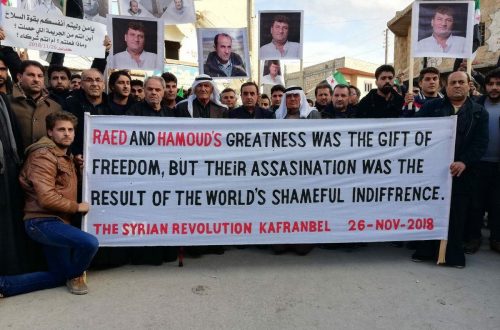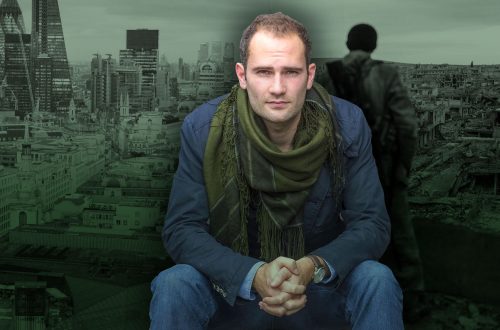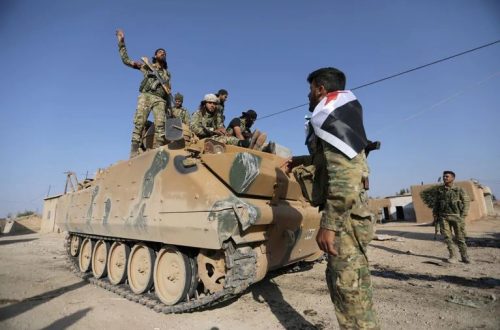Guest post by DaveM
With seven years having passed since Assad won his second term in office with 97% of the votes, it’s election time again in Syria. Balloting is scheduled for the 3rd of June.
Actor Wael Sharaf: “Elections are a right, a duty for every citizen. This is the true meaning of freedom. And we exercise it in its best way possible. I understand it. And every citizen who loves Syria understands it. Me? I’m going to vote.”
Graphic: Your vote is your freedom
Actor Mustapha Al Kahni: “They say every horse will stumble at some point. And right now if Syria is like any thoroughbred which is stumbling then I wish you’ll vote and choose the knight who you deem suitable to steer Syria in both this difficult racecourse and this difficult time. Your vote contributes in building a better tomorrow for Syria”.
Graphic: Your vote is your protection
No prizes for guessing the correct knight.
The whole process verges on the surreal– as this report illustrates:
In the ornate, wood-panelled theatre that is Syria’s parliament, an unusual ritual has played out this week.
It is part of an electoral process designed to portray all the drama of a presidential race, while ensuring nobody seriously challenges the one name on the ballot paper that counts: Candidate Assad.
Every day at around noon, sheaves of documents in super-sized envelopes have been delivered to Speaker Mohammad al-Lahham, who has solemnly unsealed them and read out the names of nominees for Syria’s presidential election next month.
When the deadline for nominations closed on Thursday, 24 names had been announced to deputies. Twenty-three are largely unknown and, despite official efforts to portray the vote as a genuine race, are destined to remain so.
The name in the 24th envelope was “Dr Bashar Hafez al-Assad”, the man who inherited power from his father 14 years ago. On Monday Assad declared that he will seek another term in the midst of a civil war which grew from protests against four decades of rule by his family.
It’s all theatre.
[A]ny suspense which that performance may have created was punctured this week by a parliamentarian from Assad’s Baath Party, who said all 161 Baath deputies in the 250-seat parliament were backing the president. Without exception.
The MP, Jamal Qadiri, told Al-Watan newspaper that the remaining 89 deputies might throw their weight behind one or two other candidates whose names would go forward onto the ballot paper to challenge Assad.
The maths, however, suggest that any one of the remaining 23 nominees faces a struggle to attract 35 votes from a pool of just 89. This opens the possibility that next month’s voting slip – as in Syrian elections of the last 40 years – will have only one name on it: Assad.
As expected the Arabic news media have responded with derision.
Muhammed Jihad al-Laham: Syrian Parliamentary Speaker: “Mr Bashar Hafez Al Assad.”
Elections which have an appearance of being multiparty elections are something unexpected and unusual for the Syrian regime, its laws and its history. The number of candidates is increasing, and they come from various different movements. Unconventionally some of them are women and in a breach of the country’s constitution one of them is a Christian.
However the one thing which these candidates have in common is that they’re all insignificant and have no influence on the political sphere. All except one of them, the 7th candidate, Bashar Al Assad.
The candidates need parliamentary approval, for the amendments which the parliament made to the constitution last month stipulate the necessity of each candidate getting the support of 35 members of parliament. Nor can a member of parliament give their support to more than one candidate. This makes the possibility of Assad’s parliament supporting anybody other than him remote.
This farce, as the opposition describe it, will most likely end with the elimination of a number of the candidates for legal reasons and the rest being eliminated for not acquiring sufficient support. The means that the Assad family will remain in power for the 5th decade in succession.
In 1971 Hafez al Assad won a referendum in which his name was the only one on the ballot paper, and he won it with 99% of the vote. The exact same thing happened in 1978. In the referendums of 1985, 1991 and 1999 Hafez al Assad took 100% of the vote, with no more than a few dozen people, out of a population of 10 million, voting no.
After the death of Assad the father in 2000 the Syrian parliament dropped the minimum age required to be president to 34 years. This new law prepared Assad the son for the presidency and after that he won a referendum with 99% of the vote. In in the 2007 referendum he got 97% of the vote.
So the regime is calling the Syrians to elections for which the outcome has already been decided. Elections in which the only people who can participate are the 50% of the population which hasn’t been driven out of its homes, being displaced both inside and outside the country.
Muhammed Jihad al-Laham: Syrian Parliamentary Speaker: “We inform you of Mr Bashar Al Assad’s nomination for the presidency of the Syrian Arab Republic.”
For the first time in 44 years the names of a number of presidential candidates were read out in the parliament. Also it was the first time that Bashar Al Assad’s name was mentioned without it being followed by a rapturous applause.
Under the dome of the parliament a then-34 year old Bashar al Assad inherited his father’s rule. This was done after a constitutional amendment lowering the minimum permitted age to be nominated president (from 40 years to 34). This amendment was ratified by a parliamentary majority, and then Assad was elected via referendum for a second term (in 2007).
Today [28 April] along with his competitors Assad is nominating himself for the presidency. And in order to have their nominations officially accepted Assad and the other nominees have to acquire the support of 35 parliamentary deputies.
These are multiparty elections though the law prohibits opposition members who are outside the country from being nominated. They describe these elections as a farce, a description which is also being used by some countries in the West.
Those who describe these elections as farcical are asking questions such as: Who is going to vote? The corpses, most of which still lie under the rubble? The internally displaced who number in their millions? Or the refugees outside the country who are suffering under appalling living conditions.
As for the other side, there are Syrians who don’t hide their joy that Assad is running for a third term, as it’s established that the 200 or more Syrians being killed every day no longer stirs the emotions of the International Community.
And it appears that the regime is carrying on doing what it began three years ago. And it has designated another million Syrians as terrorists, which will put them in the army’s line of fire.
Bashar Al Assad on Syrian State TV: “Syrian terrorists are the sons of this society. So when we’re talking about tens of thousands of terrorists it means that behind these terrorists there is a social incubator, be it a family, a relative, a neighbour, a friend or other people. This means we’re talking about hundreds of thousands, possibly millions of Syrians. If it were a million we say millions”.
These elections will result in a third term for Assad. According to observers this is confirmation of what’s been said before, in that the political initiatives which have been put out to settle the crisis have only extended the life of the regime, reaching this stage.
So what exactly is the point of these fake elections? One one hand it’s Assad telling the world that he’s going nowhere and with the end of his last seven-year term in sight it’s business of usual. On the other hand WINEP’s Andrew Tabler argues that the elections are a move by Assad to strengthen his position in regards to any negotiated settlement.
The one ace Assad has up his sleeve is the stability card. He knows the longer the war goes on the more unstable the parts of Syria outside his control will become (with the exception of the Kurdish controlled areas). Those areas are becoming magnets for foreign jihadists and the possible return of these radicalised, battle hardened jihadists has been described by France’s interior minister as a “ticking time bomb”.
With the possible exceptions of Wino and Creeper, most of the foreign fighters on the regime’s side are Iraqi, Lebanese and Iranian. It’s estimated that 400 Britons have traveled to Syria to join the jihadists on the other side.
Assad must know that the longer the war continues and the more atrocities his side carries out, the more foreign Sunnis prone to radicalization will be motivated to go to Syria and carry out jihad. This includes not only people from Europe, but also those from Middle Eastern countries allied to the West, such as Jordan and Saudi Arabia. Despite what Seamus Milne claims, these guys will be a major security threat when they return home.
For the time being all Assad has to do is dig in his heels, consolidate his power in the Western part of the country, take care not to overextend his forces and continue his campaign of bloodshed indefinitely. With Russia backing him and America’s reluctance to get involved due to Obama’s policy of “avoiding mistakes”, Assad probably feels he can take his time and keep going until the international community eventually offers a settlement which suits him.
These fake elections are merely part of this whole process. All Bashar has to do is keep the horse upright while Syria burns around him.
*See here


